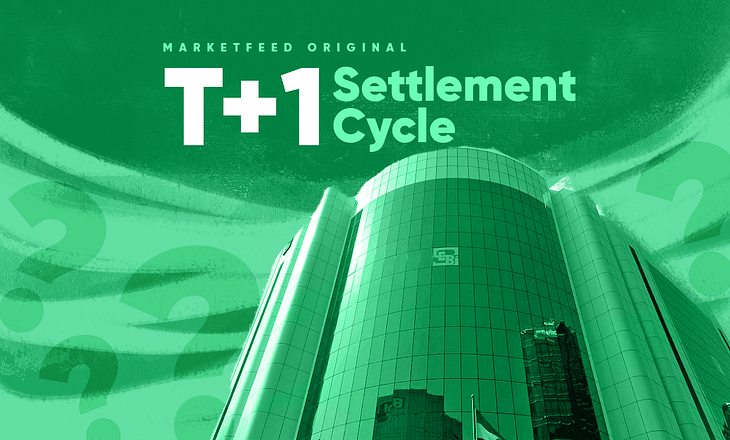SEBI Proposes T+1 Settlement Cycle on Optional Basis: All You Need to Know

Earlier this week, the Securities and Exchange Board of India (SEBI) announced that stock exchanges would have the option to move to a T+1 (Trade Date+1 Day) stock settlement cycle starting from January 1, 2022. While many have welcomed the proposal, a lot of concerns have emerged regarding the implementation of the new system. In this article, we take a closer look at how this move could impact the stock exchanges and market participants.
What is the T+1 Settlement Cycle?
Stock exchanges around the world follow a well-defined clearing and settlement system. Since 2003, India’s NSE and BSE have been offering the T+2 settlement cycle. Here, ‘T’ stands for the date of transaction, and ‘2’ denotes how many days later the transfer of stock ownership and payment to the buyer and the seller, respectively, takes place. Let us look at an example.
Suppose you buy 100 shares of ITC Limited at Rs 200 per share on September 1. The total buy value is Rs 20,000. The day you make the transaction is referred to as the trade date or ‘T Day’. An amount of Rs 20,000 (plus all applicable charges) will be debited from your trading account on that date. On T+1 (Sept 2), the amount required to purchase the shares is collected by the exchange. The exchange transaction charges and Securities Transaction Tax (STT) is also collected. On T+2 (Sept 3), the shares are debited from the Demat account of the person who sold you the shares and credited to the broker with whom you are trading. The broker will then credit the 100 shares to your Demat account. On T+2, the amount that was debited from your end is credited to the person who sold the shares.
Now, SEBI has introduced a shorter settlement cycle— the T+1. Once you place a buy order for a stock, the entire settlement process will be completed within the next day. A stock exchange will have to give at least one month’s prior notice to the public regarding the move to a T+1 settlement on any stock. After opting for a T+1 cycle for a stock, the exchange will have to mandatorily continue with the same system for a minimum of six months.
How Will This Move be Beneficial?
The move to a T+1 cycle will accelerate the entire settlement process. It would benefit retail investors as they will get quicker access to cash and securities (shares) after trades are executed. Moreover, it will reduce the risks associated with fluctuations in share prices during the settlement cycle.
A shorter settlement cycle will provide greater flexibility to the stock exchanges. It will make them more efficient, free up capital, boost liquidity, and reduce default risks. [Default risks refer to the inability to make timely payments]. NSE and BSE had moved from a T+3 cycle to T+2 on similar grounds in 2003.
Concerns Regarding SEBI’s Proposal
Zerodha co-founder Nithin Kamath posted a tweet stating a potential complication of the move to a T+1 settlement cycle. He said the concerned authorities may need to figure out how the settlements will work if one exchange adopts T+1 and the other is on T+2 when the same stock trades on both exchanges. A mismatch in the settlement cycle will prove to be confusing and chaotic for investors and traders. It may affect trading volumes as well. However, many experts argue that either NSE and BSE will both move to the T+1 cycle, or both will stick to the current regime.
Many operational and technical challenges need to be tackled before implementing the T+1 settlement system. All institutions involved in the stock market (brokers, exchanges, banks) will have to increase their efficiency for the delivery of shares and exchange of money within one day. This move will lead to an increase in the working capital requirements for brokers. Banks and depository participants will face extended working hours. These institutions could pass down the costs to us investors and traders.
Pressure from FPIs
T+1 might prove to be difficult for certain classes of institutional shareholders. The Association of National Exchange Members of India, the Asia Securities Industry and Financial Markets Association (ASIFMA), and overseas traders have expressed concerns over the operational and technical implications of the move. Since working hours in the US and Europe are not aligned to Asia Pacific markets, T+2 settlement effectively functions as T+1. Any error or disparity in a transaction is normally discovered on T+1. Thus, shortening the settlement cycle could lead to high costs and settlement risks for Foreign Portfolio Investors (FPIs).
A move to a T+1 cycle in India would mean that FPIs will have to keep money and shares ready with them on the day of the transaction. Thus, inflows from foreign investors would be adversely affected. FPIs have written to SEBI regarding a potential reversal of market gains due to unforeseen consequences of moving to the new system.
What are your views on SEBI’s proposal for a move to a T+1 settlement cycle? Let us know in the comments section of the marketfeed app.


Post your comment
No comments to display